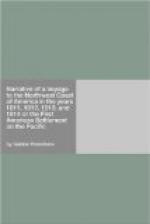considering the small stock of provisions they had
left. Nevertheless, as there was no time to lose
in deliberation, after depositing in a
cache
the superfluous part of their baggage, they divided
themselves into four companies, under the command
of Messrs. M’Kenzie, Hunt, M’Lellan and
Crooks, and proceeded to follow the course of the
stream, which they named
Mad river, on account
of the insurmountable difficulties it presented.
Messrs. M’Kenzie and M’Lellan took the
right bank, and Messrs. Hunt and Crook the left.
They counted on arriving very quickly at the Columbia;
but they followed this Mad river for twenty days, finding
nothing at all to eat, and suffering horribly from
thirst. The rocks between which the river flows
being so steep and abrupt as to prevent their descending
to quench their thirst (so that even their dogs died
of it), they suffered the torments of Tantalus, with
this difference, that he had the water which he could
not reach above his head, while our travellers had
it beneath their feet. Several, not to die of
this raging thirst, drank their own urine: all,
to appease the cravings of hunger, ate beaver skins
roasted in the evening at the camp-fire. They
even were at last constrained to eat their moccasins.
Those on the or southeast bank, suffered, however,
less than the others, because they occasionally fell
in with Indians, utterly wild indeed, and who fled
at their approach, carrying off their horses.
According to all appearances these savages had never
seen white men. Our travellers, when they arrived
in sight of the camp of one of these wandering hordes,
approached it with as much precaution, and with the
same stratagem that they would have used with a troop
of wild beasts. Having thus surprised them, they
would fire upon the horses, some of which would fall;
but they took care to leave some trinkets on the spot,
to indemnify the owners for what they had taken from
them by violence. This resource prevented the
party from perishing of hunger.
Mr. M’Kenzie having overtaken Mr. M’Lellan,
their two companies pursued the journey together.
Very soon after this junction, they had an opportunity
of approaching sufficiently near to Mr. Hunt, who,
as I have remarked, was on the other bank, to speak
to him, and inform him of their distressed state.
Mr. Hunt caused a canoe to be made of a horse-hide;
it was not, as one may suppose, very large; but they
succeeded, nevertheless, by that means, in conveying
a little horse-flesh to the people on the north bank.
It was attempted, even, to pass them across, one by
one (for the skiff would not hold any more); several
had actually crossed to the south side, when, unhappily,
owing to the impetuosity of the current, the canoe
capsized, a man was drowned, and the two parties lost
all hope of being able to unite. They continued
their route, therefore, each on their own side of the
river. In a short time those upon the north bank
came to a more considerable stream, which they followed




